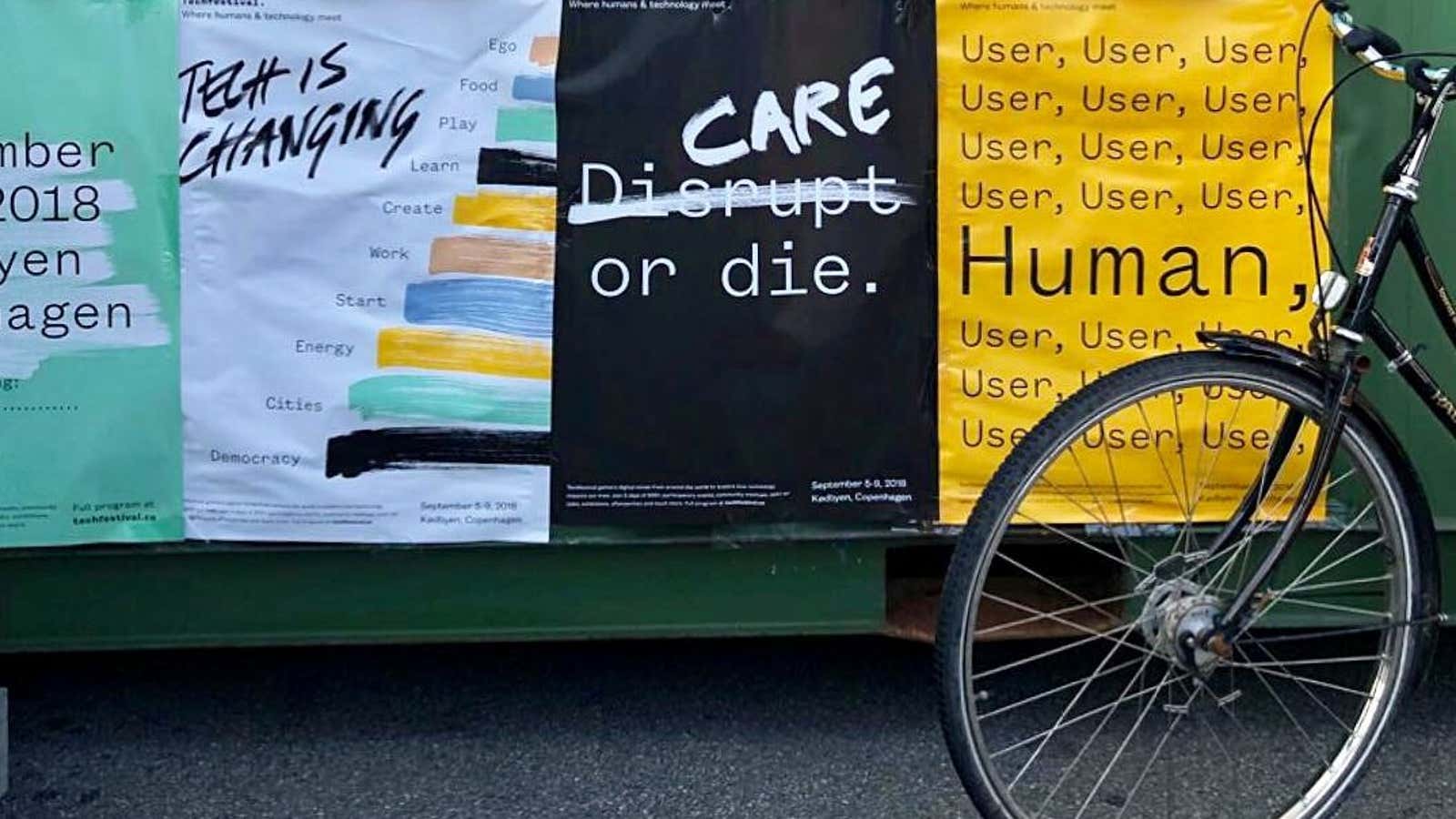A new kind of tech conference took over Copenhagen’s meatpacking district last week. Founded by a group of Danish entrepreneurs and designers who were weary of the seeming lack of ethical boundaries in Silicon Valley, Techfestival offered a “human response to tech.”
“You don’t have to be a tech insider to see that Big Tech is in the midst of a true thunderstorm,” explains festival director Marie Louise Gørvild. “We are longing for new thinking and the next wave in tech…No one has all the answers. This is why we have designed Techfestival as a participatory place, where everyone can play a role.”
Attended by more than 16,000 people over five days, Techfestival indeed looked and felt more like a public forum than the usual tech convention. There were no sponsor booths, no gadget demos, no queues, no swag bags, nor big conference badges that broadcasted your name, company, and status. The conference fee was nominal—$30—and there were no real checkpoints to stop anyone from wandering in without the Techfestival bracelet. Plenary talks were held on an open-air stage and participants—some toting babies and dogs—chose from more than 200 events scattered throughout the city’s former cattle market.
Several gatherings began with all participants standing in a big circle and introducing themselves by their fist names and how they were feeling at the moment—not only by their job titles. Another gathering I participated in began with group singing of Bob Dylan’s folk song Blowing in the Wind. Just when I could feel my cynicism creep in, I was reminded of how beautiful it is to actually be part of a chorus of human voices.
Topics were framed in practical terms. Collectively they illustrated how technologies—from blockchain to AI—shape our governments, food systems, personal relationships and families. On the festival’s fourth day, a troop of young coders took over the main stage, while several parents listened to a talk about the MyMonii app which helps kids keep track of their allowance and money earned for doing chores. And even outside of the children-focused programming, kids were present and welcome. Seeing the future stewards and users of tech be exposed to ethical debates was heartening and inspiring, even though they may not have comprehended everything.
Subverting the predictable template for exclusive, tech industry conferences was by design, explains Techfestival co-foudner Thomas Madsen-Mygdal. By erecting Techfestival’s main stage in a public parking lot, for instance, the conference organizers hoped to foster an atmosphere where there are “no tech bros in echo chambers in dark convention halls forgetting the world.” Holding the event within a vibrant food district—with one of Copenhagen’s best coffeeshops mere paces from the main stage—saved on both catering and erecting public facilities.
Of course, a volunteer-led, collaborative gathering will have some hiccups. Some international visitors complained about the lack of wifi and charging ports, and some events ran a bit late. There were some vestiges of the old tech conference template, like the familiar, rambling keynote American science fiction author Bruce Sterling gave at the concluding event of Techfestival.
But all these hiccups—or so called “moments of friction”—are precisely what makes a gathering like Techfestival so vital in today’s seamless world. It was refreshing to be required to talk to people again and to experience serendipitous connections sans name badges. Having someone lend you their phone charger or open their office to let you use the bathroom could turn into a moment of friendship. There was such freedom in feeling “un-curated.”
Copenhagen’s Techfestival shows why tech conferences should be open to anyone interested in learning how digital technology is conceived, shaped, and decided upon. Technology is used by everyone, and conversations about it ought to be for everyone, too—not just its hoodie-wearing makers.
